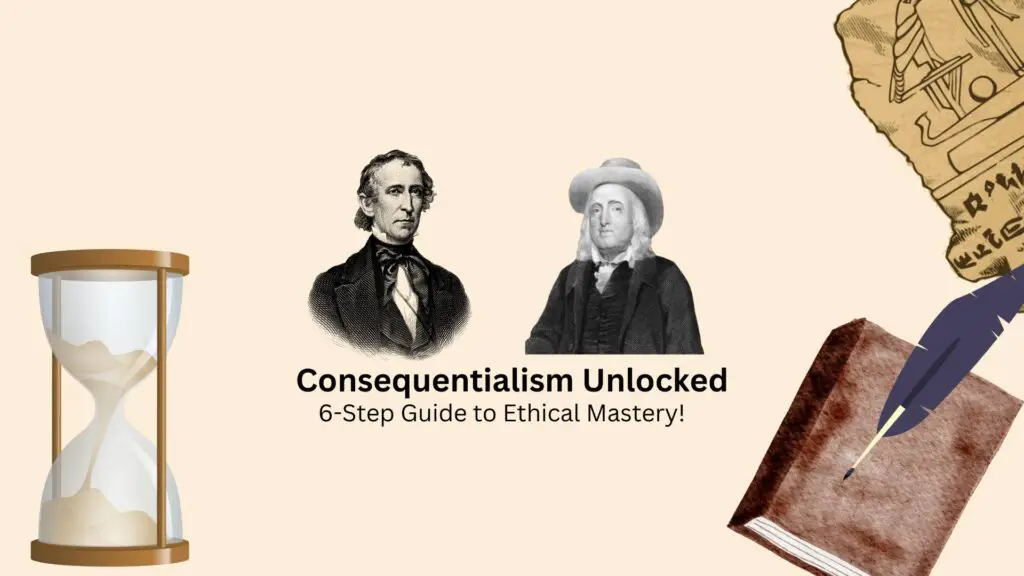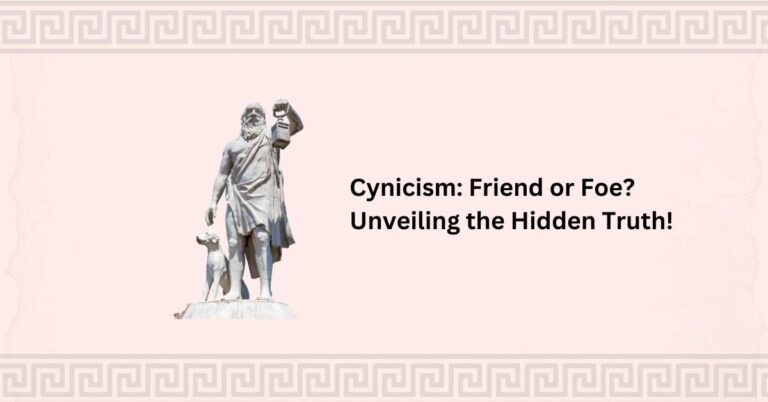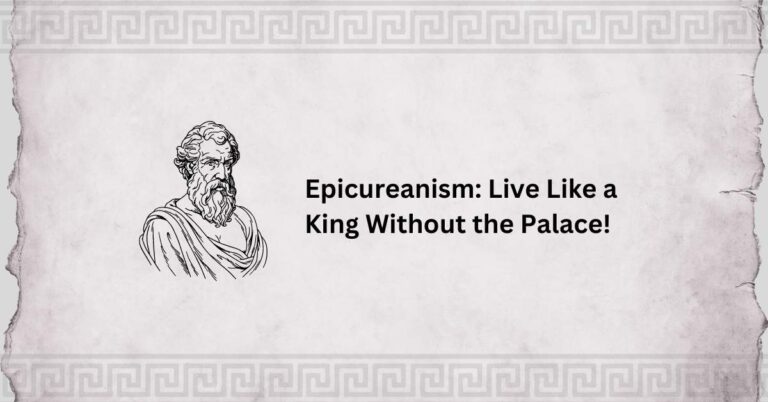Consequentialism Unlocked: 6-Step Guide to Ethical Mastery!
Consequentialism is an ethical theory that suggests the rightness or wrongness of an action is determined by its consequences. In other words, an action is considered morally good if it leads to positive outcomes and morally bad if it leads to negative outcomes. The main idea is that the end results of our actions are what matter most when deciding if something is right or wrong.
Why does this matter? In both everyday decisions and monumental choices, this theory offers a guiding light. This blog post aims to peel back the layers of consequentialism. We’ll explore its various forms, how it applies in real-world scenarios, and the lively debates it sparks among thinkers.
Imagine this: you’re faced with a decision that could either save a village but destroy its ancient heritage or preserve history at the risk of lives. What would you choose? This is a classic scenario where consequentialist logic plays a crucial role. As we dive into the nuances of consequentialism, keep this scenario in mind and ask yourself: “What outcomes truly matter?”
1. The Basics of Consequentialism:
The essence of Consequentialism is straightforward yet profound: the ends justify the means. This view shifts our moral focus from the actions themselves to the results they produce.
The roots of Consequentialism stretch back to ancient times, but it was during the Enlightenment that it gained significant traction.
Philosophers Jeremy Bentham and John Stuart Mill were pivotal figures. Bentham introduced utilitarianism, a form of Consequentialism that promotes actions leading to the greatest happiness for the greatest number. Following him, Mill refined these ideas further, emphasizing not just the quantity but the quality of happiness generated.
The core principle of Consequentialism is that the moral worth of our actions depends exclusively on their consequences. This means that a morally right action is one that results in a net positive effect on the world.
Consequential thinking ties directly into this. It requires us to evaluate the potential outcomes of our actions before making decisions. Think of it as strategic planning in ethics. When faced with a choice, a consequentialist asks, “What will lead to the best overall outcome?” This approach challenges us to forecast the ripple effects of our actions, weighing the potential benefits and harms.
As we proceed, keep in mind this foundational idea: In consequentialism, it’s not just about what you do, but what results from what you do. This perspective is not only fascinating but also immensely practical in navigating complex moral landscapes.
2. Types of Consequentialism:
Consequentialism branches into several intriguing subtypes, each offering a different perspective on how best to evaluate the consequences of our actions. Let’s explore these variations.
Utilitarianism
Utilitarianism is perhaps the most well-known form of consequentialism. It’s rooted in the principle of maximizing happiness or utility. The foundational belief is that an action is right if it produces the greatest amount of happiness for the greatest number of people. Jeremy Bentham, the father of modern utilitarianism, championed this quantitative approach to ethics. John Stuart Mill later expanded on Bentham’s ideas, introducing a qualitative aspect—some pleasures are inherently more valuable than others.
Egoism
Moving from the societal to the individual, egoism defines right actions as those that maximize the agent’s own happiness and well-being. Unlike utilitarianism, which looks outward, egoism turns the gaze inward, focusing on self-interest. This form of consequentialism argues that moral actions are those that serve one’s self best.
Contrast with Altruistic Consequentialism:
Altruistic consequentialism is the polar opposite of egoism. It prioritizes the welfare of others rather than self-interest. While egoists might save for personal gain, altruists save primarily for the benefit of others.
Rule Consequentialism
This subtype shifts focus from individual acts (act consequentialism) to the rules that govern actions. Rule consequentialism suggests that the morality of an action depends on whether it adheres to a set of rules which, if followed, tend to produce good consequences.
- Real-World Examples:
Consider the rule against lying. Even though a lie might sometimes lead to good outcomes, rule consequentialists argue that more often than not, lying leads to harmful consequences. Thus, a rule that promotes honesty can generally result in better overall outcomes for society.
Understanding these types of consequentialism enriches our grasp of how diverse this ethical theory truly is. Each type offers a unique lens through which we can evaluate our choices and their impacts on the world around us.
3. Key Concepts in Consequentialism:
To fully understand consequentialism, it’s essential to grasp some of its foundational concepts. These ideas form the backbone of how consequentialists think and make decisions.
Utility
Utility, in the context of consequentialism, refers to the total satisfaction or happiness generated by an action. The importance of utility is paramount—it serves as the measuring stick for determining the moral worth of our actions. The principle of “the greatest good for the greatest number” encapsulates this idea by advocating that actions should aim to maximize happiness for the largest group of people. This concept is not only a moral guideline but also a practical approach to resolving ethical dilemmas.
Pleasure and Pain
Central to many consequentialist theories is the balance of pleasure and pain. These theories often argue that actions leading to pleasure (or happiness) are morally preferable, whereas those causing pain are to be avoided. This duality is crucial because it provides a clear criterion: choose actions that increase pleasure and reduce pain.
Cost-Benefit Analysis
Cost-benefit analysis is a practical tool borrowed from economics but extensively used in consequentialist thinking. It involves weighing the positive outcomes (benefits) of an action against the negative outcomes (costs). For example, a government deciding whether to build a new public park would consider the benefits (community health, environmental improvement) against the costs (budgetary expenditures, potential environmental disruption).
Moral Calculus
Moral calculus is an approach within consequentialism where one attempts to quantitatively sum up the positive and negative consequences of different actions to determine which is the most ethical. This concept was famously developed by Bentham, who proposed that we could literally calculate the moral value of actions based on factors like intensity, duration, certainty, and proximity of expected pleasures and pains. While it might sound a bit mechanical, moral calculus encourages a rigorously thoughtful approach to ethics, pushing us to consider all potential impacts of our actions.
By delving into these concepts, we gain a deeper insight into how consequentialism applies a systematic and often quantitative approach to ethics, aiming to produce the most favorable outcomes through well-considered actions.
4. Applications of Consequentialism:
Consequentialism isn’t just a theoretical framework; it has practical applications in various aspects of life, from public policy and business ethics to personal decision-making.
In Public Policy
Public policy often utilizes consequentialist reasoning to justify decisions aimed at the welfare of the population. For example, when a government decides to invest in renewable energy, the decision is typically based on a consequentialist analysis—reducing environmental harm and providing long-term energy sustainability, thus benefiting the greatest number.
In Business Ethics
Businesses frequently adopt consequentialist approaches to navigate ethical dilemmas. A company might decide to implement fair labor practices not just because it’s the right thing to do but because it results in happier employees, which in turn leads to increased productivity and profit. This perspective aligns with the interests of stakeholders and shareholders alike.
In Personal Decision-Making
On a personal level, consequentialism can shape our everyday decisions. Consider the decision to buy organic food. One might choose organic to support sustainable farming practices, which contribute to long-term environmental health, demonstrating how consequentialist thinking impacts even our routine choices.
5. Criticisms and Challenges:
While consequentialism is influential, it’s not without its criticisms and challenges, which spark ongoing debates in ethical philosophy.
Major Criticisms
One of the main criticisms is the impracticality of predicting outcomes. Critics argue that it’s often impossible to accurately forecast all consequences of an action, which can lead to unintended results. Additionally, consequentialism is sometimes critiqued for neglecting justice and rights. For instance, it might justify a morally questionable action if it leads to a greater overall good, potentially overlooking individual rights.
Consequentialist Responses
In response, consequentialists often argue that while perfect prediction is impossible, we can use empirical data and historical trends to make well-informed guesses about outcomes. Moreover, some consequentialists integrate concerns about rights and justice into their analyses, arguing that respecting these often leads to better overall outcomes.
Real-World Dilemmas
Consider a scenario where a hospital has only one ventilator but two patients need it to survive. Choosing whom to save is a consequentialist dilemma that tests the limits of calculating and comparing outcomes. This kind of situation highlights the practical and moral complexities involved in consequentialist decision-making.
These discussions show that while consequentialism offers a compelling framework for ethical reasoning, it also faces significant philosophical and practical challenges that continue to fuel lively debates in ethics.
6. Consequentialism vs. Other Ethical Theories:
Consequentialism is a prominent ethical framework, but it’s not the only one. Understanding how it compares and contrasts with other major theories, such as deontological ethics and virtue ethics, can provide a broader perspective on moral philosophy. Additionally, exploring hybrid approaches like rule utilitarianism reveals attempts to bridge the gaps between these theories.
Comparison with Deontological Ethics
Deontological ethics, founded by philosophers like Immanuel Kant, focuses on adherence to duty or rules, regardless of the outcome. This contrasts sharply with consequentialism, which values the outcome over the adherence to rules. For example, a deontologist would argue that lying is always wrong, even if telling the truth would result in harm because honesty is a moral duty. A consequentialist, on the other hand, might justify lying if it leads to better overall outcomes.
Examination of Virtue Ethics
Virtue ethics, which dates back to Aristotle, emphasizes the character and virtues of the individual rather than the morality of specific actions. Virtue ethics is concerned with developing good character traits like courage, temperance, and wisdom. This contrasts with consequentialism, which is less concerned with the actor’s virtues and more with the impact of their actions. Where consequentialism might assess actions based on their results, virtue ethics encourages actions that cultivate a virtuous life, even if such actions do not always lead to the best immediate outcome.
Discussing Hybrid Approaches: Rule Utilitarianism
Rule utilitarianism is a hybrid approach that combines the rule-based framework of deontological ethics with the outcome-focused approach of utilitarianism. This theory suggests that we should follow rules that, if generally adopted, would lead to the greatest good for the greatest number. Unlike act utilitarianism, which assesses each action individually, rule utilitarianism considers the long-term consequences of adhering to rules. This approach attempts to maintain the benefits of consequentialist thinking while mitigating risks like unpredictability and moral dilemmas that can arise from assessing actions on a case-by-case basis.
Conclusion:
In this exploration of consequentialism, we’ve traversed through its various facets, from its basic principles and subtypes, such as utilitarianism and rule consequentialism, to its application in fields like public policy and business ethics. By examining how consequentialism compares with other ethical theories like deontological ethics and virtue ethics and addressing its criticisms, we gain a multifaceted understanding of its strengths and limitations.
Consequentialism, with its focus on the outcomes of actions, encourages a pragmatic and outcome-oriented approach to ethics. This focus is particularly relevant in today’s complex world where our decisions can have far-reaching effects—effects that are magnified by technological advances and global interconnectedness. The theory prompts us to consider not just the immediate benefits or harms of our actions, but their broader implications on society and future generations.
Reflecting on consequentialism isn’t merely an academic exercise; it’s a practical tool that can guide everyday decision-making. From personal choices about consumption and lifestyle to professional decisions that may impact many others, consequentialism invites us to weigh our options not just by what feels right but by what will do the most good.
As we continue to face new ethical challenges—from climate change to artificial intelligence—the principles of consequentialism can help us navigate these complexities. By learning more about consequentialism and engaging with its principles, we equip ourselves to make decisions that are not only informed by immediate contexts but also by a broader understanding of their potential impacts.
I encourage readers to delve deeper into this fascinating branch of moral philosophy. Whether through academic studies, reading, or simply by applying its principles to daily life decisions, there is much to gain from understanding and utilizing consequentialism. It’s a journey that not only broadens our ethical horizons but also enhances our capacity to contribute positively in various spheres of life.



